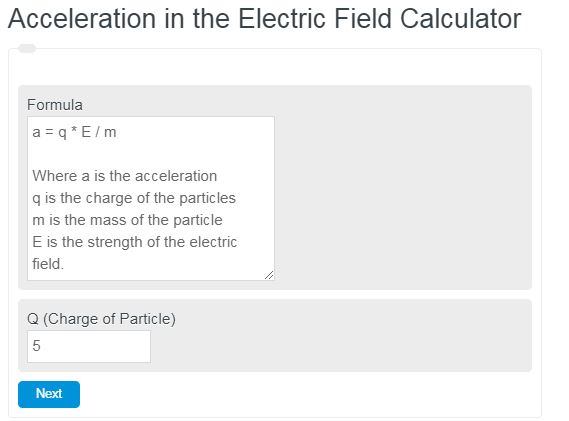Enter the mass, charge, and electric field acting on a particle or object to calculate the resulting acceleration due to the electric field.
- Coulomb’s Law Calculator
- Ohm’s Law Calculator
- Electric Field Calculator
- Magnetic Flux Calculator
- Acceleration Calculator
- Average Acceleration Calculator
- Magnitude of Acceleration Calculator
- Particle Acceleration Calculator
- Electron Mobility Calculator
Electric Acceleration Formula
The following formula can be used to calculate the acceleration of an object due to an electric field.
a = q * E / m
- Where a is the acceleration
- q is the charge of the particles
- m is the mass of the particle
- E is the strength of the electric field.
To analyze this equation further, we can look at the equation for Newton’s law which states F = m * a. From this equation, we can solve for the acceleration. So, a = F/m where F is the force and a is the mass. In terms of electric fields and particles, this force can be calculated through the following formula. F = q * E where q is the charge of the particle and E is the strength of the electric field. Finally, substitute q*E into the F=m* equation and we have our resulting formula used by the calculator.
Acceleration in an Electric Field Definition
The acceleration in an electric field is defined as the total acceleration of a particle due to the force of an electric field.
How to calculate acceleration in an electric field?
How to calculate acceleration in an electric field?
- First, determine the charge of the particles.
Measure the total charge of the particle or particles being analyzed.
- Next, determine the mass of the particles.
Measure or calculate the mass of the particle.
- Next, determine the strength of the electric field.
Measure how strong a force the electric field produces.
- Finally, calculate the acceleration.
Calculate the acceleration using the information from steps 1-3.
FAQ
The acceleration in an electric field is defined as the total acceleration of a particle due to the force of an electric field.
